Comparative Analysis: Cognitive and Humanistic Psychology Essay
VerifiedAdded on 2022/08/20
|6
|1501
|21
Essay
AI Summary
This essay provides a comprehensive overview of two prominent psychological approaches: the cognitive and the humanistic approaches. It delves into how these approaches explain human behavior, with a specific focus on personality. The essay outlines the key principles of each approach, highlighting the cognitive approach's emphasis on internal mental processes and the humanistic approach's focus on individual differences and self-actualization. Furthermore, it examines how each approach conceptualizes personality, contrasting the cognitive view of personality traits with the humanistic perspective on self-realization. The essay also analyzes the strengths and weaknesses of both approaches, such as the cognitive approach's reliance on laboratory experiments and the humanistic approach's emphasis on subjective experiences. In conclusion, the study offers a comparative analysis of the two approaches, providing valuable insights into their respective contributions to understanding human behavior and personality.
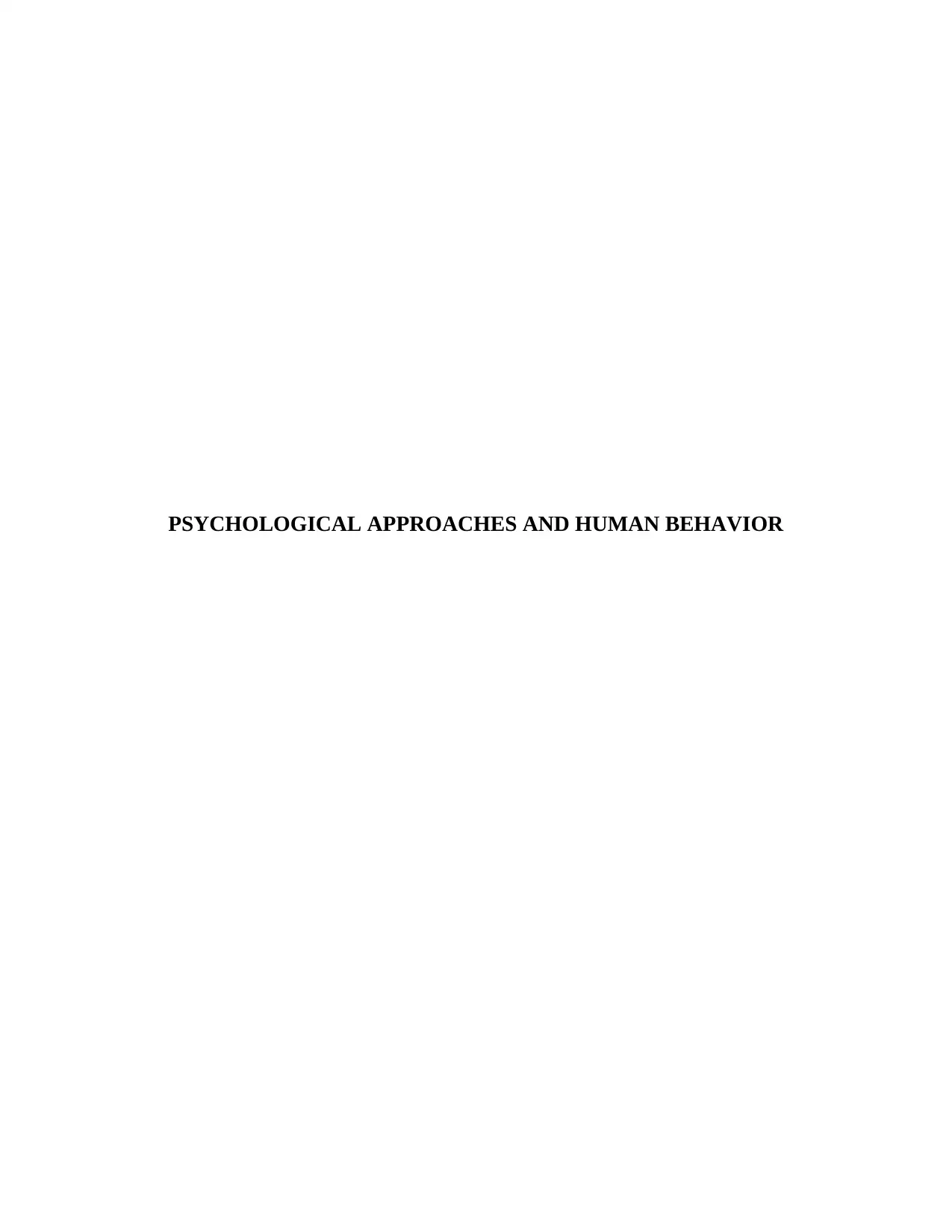
PSYCHOLOGICAL APPROACHES AND HUMAN BEHAVIOR
Paraphrase This Document
Need a fresh take? Get an instant paraphrase of this document with our AI Paraphraser
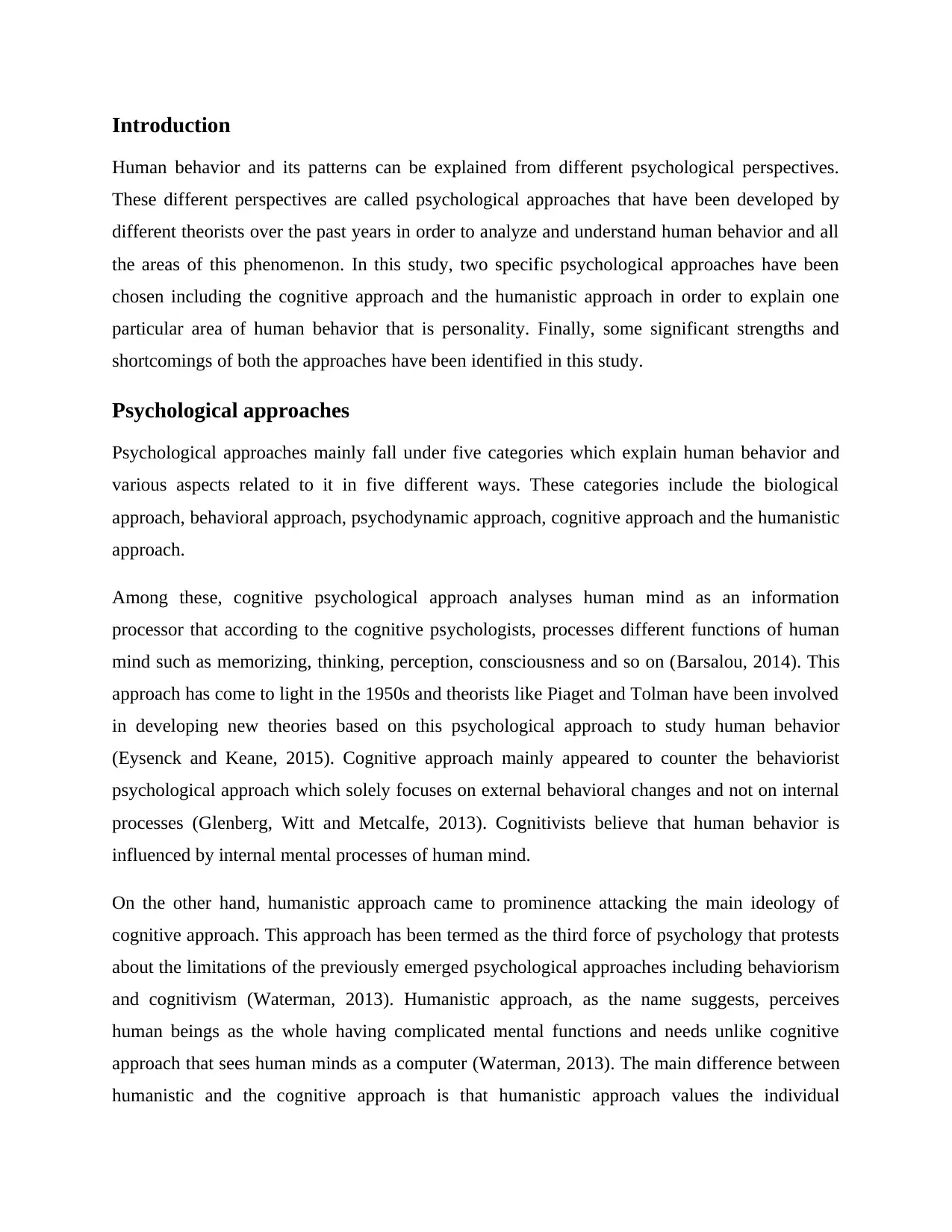
Introduction
Human behavior and its patterns can be explained from different psychological perspectives.
These different perspectives are called psychological approaches that have been developed by
different theorists over the past years in order to analyze and understand human behavior and all
the areas of this phenomenon. In this study, two specific psychological approaches have been
chosen including the cognitive approach and the humanistic approach in order to explain one
particular area of human behavior that is personality. Finally, some significant strengths and
shortcomings of both the approaches have been identified in this study.
Psychological approaches
Psychological approaches mainly fall under five categories which explain human behavior and
various aspects related to it in five different ways. These categories include the biological
approach, behavioral approach, psychodynamic approach, cognitive approach and the humanistic
approach.
Among these, cognitive psychological approach analyses human mind as an information
processor that according to the cognitive psychologists, processes different functions of human
mind such as memorizing, thinking, perception, consciousness and so on (Barsalou, 2014). This
approach has come to light in the 1950s and theorists like Piaget and Tolman have been involved
in developing new theories based on this psychological approach to study human behavior
(Eysenck and Keane, 2015). Cognitive approach mainly appeared to counter the behaviorist
psychological approach which solely focuses on external behavioral changes and not on internal
processes (Glenberg, Witt and Metcalfe, 2013). Cognitivists believe that human behavior is
influenced by internal mental processes of human mind.
On the other hand, humanistic approach came to prominence attacking the main ideology of
cognitive approach. This approach has been termed as the third force of psychology that protests
about the limitations of the previously emerged psychological approaches including behaviorism
and cognitivism (Waterman, 2013). Humanistic approach, as the name suggests, perceives
human beings as the whole having complicated mental functions and needs unlike cognitive
approach that sees human minds as a computer (Waterman, 2013). The main difference between
humanistic and the cognitive approach is that humanistic approach values the individual
Human behavior and its patterns can be explained from different psychological perspectives.
These different perspectives are called psychological approaches that have been developed by
different theorists over the past years in order to analyze and understand human behavior and all
the areas of this phenomenon. In this study, two specific psychological approaches have been
chosen including the cognitive approach and the humanistic approach in order to explain one
particular area of human behavior that is personality. Finally, some significant strengths and
shortcomings of both the approaches have been identified in this study.
Psychological approaches
Psychological approaches mainly fall under five categories which explain human behavior and
various aspects related to it in five different ways. These categories include the biological
approach, behavioral approach, psychodynamic approach, cognitive approach and the humanistic
approach.
Among these, cognitive psychological approach analyses human mind as an information
processor that according to the cognitive psychologists, processes different functions of human
mind such as memorizing, thinking, perception, consciousness and so on (Barsalou, 2014). This
approach has come to light in the 1950s and theorists like Piaget and Tolman have been involved
in developing new theories based on this psychological approach to study human behavior
(Eysenck and Keane, 2015). Cognitive approach mainly appeared to counter the behaviorist
psychological approach which solely focuses on external behavioral changes and not on internal
processes (Glenberg, Witt and Metcalfe, 2013). Cognitivists believe that human behavior is
influenced by internal mental processes of human mind.
On the other hand, humanistic approach came to prominence attacking the main ideology of
cognitive approach. This approach has been termed as the third force of psychology that protests
about the limitations of the previously emerged psychological approaches including behaviorism
and cognitivism (Waterman, 2013). Humanistic approach, as the name suggests, perceives
human beings as the whole having complicated mental functions and needs unlike cognitive
approach that sees human minds as a computer (Waterman, 2013). The main difference between
humanistic and the cognitive approach is that humanistic approach values the individual
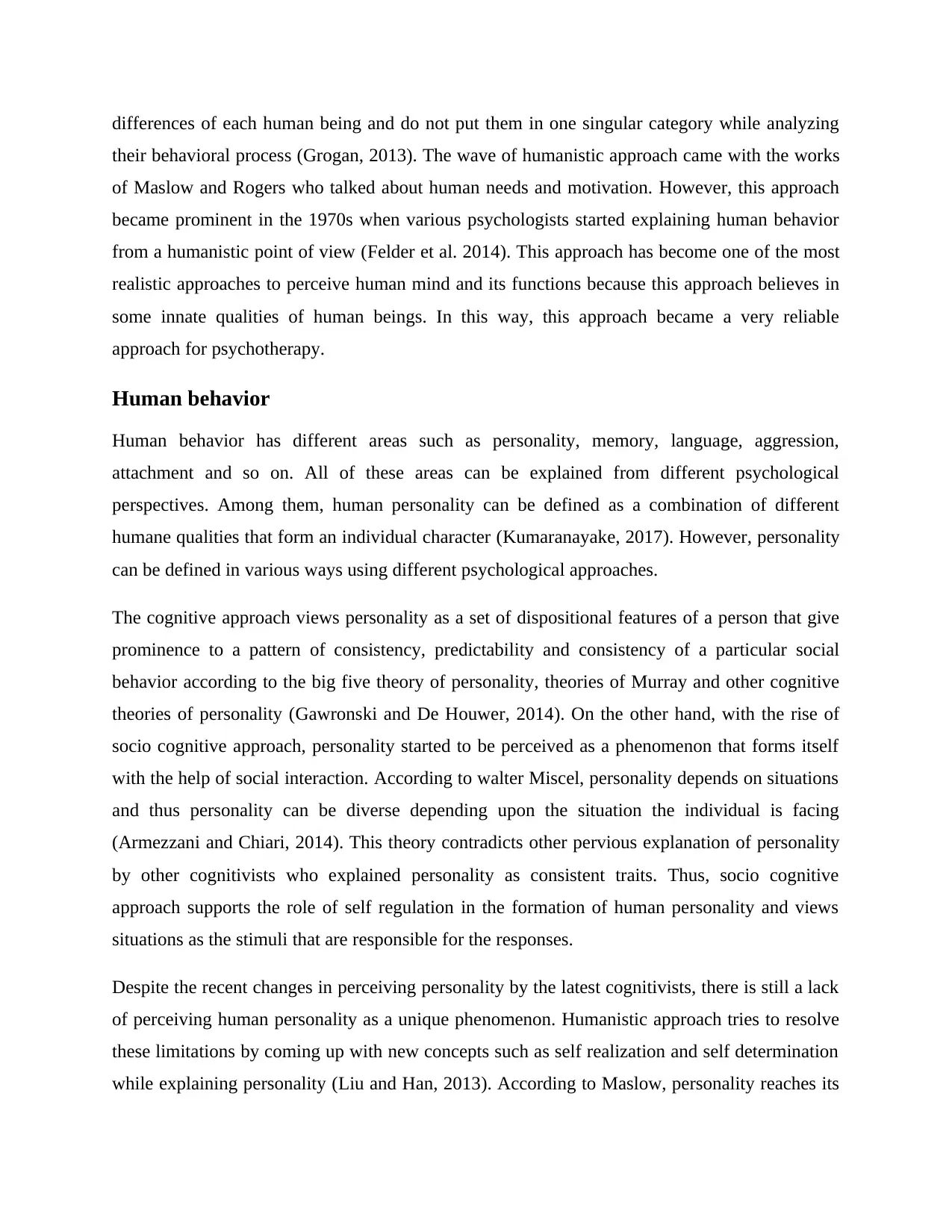
differences of each human being and do not put them in one singular category while analyzing
their behavioral process (Grogan, 2013). The wave of humanistic approach came with the works
of Maslow and Rogers who talked about human needs and motivation. However, this approach
became prominent in the 1970s when various psychologists started explaining human behavior
from a humanistic point of view (Felder et al. 2014). This approach has become one of the most
realistic approaches to perceive human mind and its functions because this approach believes in
some innate qualities of human beings. In this way, this approach became a very reliable
approach for psychotherapy.
Human behavior
Human behavior has different areas such as personality, memory, language, aggression,
attachment and so on. All of these areas can be explained from different psychological
perspectives. Among them, human personality can be defined as a combination of different
humane qualities that form an individual character (Kumaranayake, 2017). However, personality
can be defined in various ways using different psychological approaches.
The cognitive approach views personality as a set of dispositional features of a person that give
prominence to a pattern of consistency, predictability and consistency of a particular social
behavior according to the big five theory of personality, theories of Murray and other cognitive
theories of personality (Gawronski and De Houwer, 2014). On the other hand, with the rise of
socio cognitive approach, personality started to be perceived as a phenomenon that forms itself
with the help of social interaction. According to walter Miscel, personality depends on situations
and thus personality can be diverse depending upon the situation the individual is facing
(Armezzani and Chiari, 2014). This theory contradicts other pervious explanation of personality
by other cognitivists who explained personality as consistent traits. Thus, socio cognitive
approach supports the role of self regulation in the formation of human personality and views
situations as the stimuli that are responsible for the responses.
Despite the recent changes in perceiving personality by the latest cognitivists, there is still a lack
of perceiving human personality as a unique phenomenon. Humanistic approach tries to resolve
these limitations by coming up with new concepts such as self realization and self determination
while explaining personality (Liu and Han, 2013). According to Maslow, personality reaches its
their behavioral process (Grogan, 2013). The wave of humanistic approach came with the works
of Maslow and Rogers who talked about human needs and motivation. However, this approach
became prominent in the 1970s when various psychologists started explaining human behavior
from a humanistic point of view (Felder et al. 2014). This approach has become one of the most
realistic approaches to perceive human mind and its functions because this approach believes in
some innate qualities of human beings. In this way, this approach became a very reliable
approach for psychotherapy.
Human behavior
Human behavior has different areas such as personality, memory, language, aggression,
attachment and so on. All of these areas can be explained from different psychological
perspectives. Among them, human personality can be defined as a combination of different
humane qualities that form an individual character (Kumaranayake, 2017). However, personality
can be defined in various ways using different psychological approaches.
The cognitive approach views personality as a set of dispositional features of a person that give
prominence to a pattern of consistency, predictability and consistency of a particular social
behavior according to the big five theory of personality, theories of Murray and other cognitive
theories of personality (Gawronski and De Houwer, 2014). On the other hand, with the rise of
socio cognitive approach, personality started to be perceived as a phenomenon that forms itself
with the help of social interaction. According to walter Miscel, personality depends on situations
and thus personality can be diverse depending upon the situation the individual is facing
(Armezzani and Chiari, 2014). This theory contradicts other pervious explanation of personality
by other cognitivists who explained personality as consistent traits. Thus, socio cognitive
approach supports the role of self regulation in the formation of human personality and views
situations as the stimuli that are responsible for the responses.
Despite the recent changes in perceiving personality by the latest cognitivists, there is still a lack
of perceiving human personality as a unique phenomenon. Humanistic approach tries to resolve
these limitations by coming up with new concepts such as self realization and self determination
while explaining personality (Liu and Han, 2013). According to Maslow, personality reaches its
⊘ This is a preview!⊘
Do you want full access?
Subscribe today to unlock all pages.

Trusted by 1+ million students worldwide
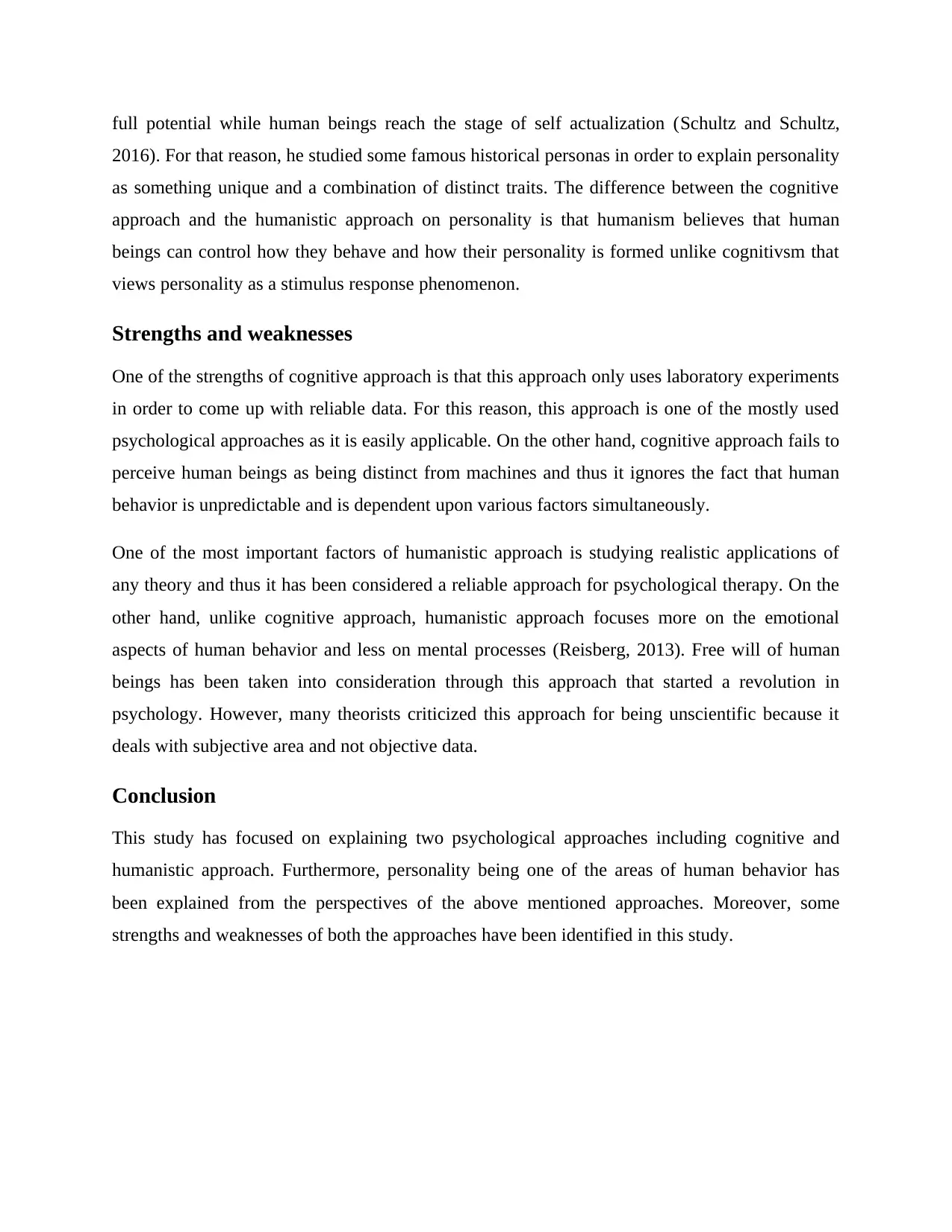
full potential while human beings reach the stage of self actualization (Schultz and Schultz,
2016). For that reason, he studied some famous historical personas in order to explain personality
as something unique and a combination of distinct traits. The difference between the cognitive
approach and the humanistic approach on personality is that humanism believes that human
beings can control how they behave and how their personality is formed unlike cognitivsm that
views personality as a stimulus response phenomenon.
Strengths and weaknesses
One of the strengths of cognitive approach is that this approach only uses laboratory experiments
in order to come up with reliable data. For this reason, this approach is one of the mostly used
psychological approaches as it is easily applicable. On the other hand, cognitive approach fails to
perceive human beings as being distinct from machines and thus it ignores the fact that human
behavior is unpredictable and is dependent upon various factors simultaneously.
One of the most important factors of humanistic approach is studying realistic applications of
any theory and thus it has been considered a reliable approach for psychological therapy. On the
other hand, unlike cognitive approach, humanistic approach focuses more on the emotional
aspects of human behavior and less on mental processes (Reisberg, 2013). Free will of human
beings has been taken into consideration through this approach that started a revolution in
psychology. However, many theorists criticized this approach for being unscientific because it
deals with subjective area and not objective data.
Conclusion
This study has focused on explaining two psychological approaches including cognitive and
humanistic approach. Furthermore, personality being one of the areas of human behavior has
been explained from the perspectives of the above mentioned approaches. Moreover, some
strengths and weaknesses of both the approaches have been identified in this study.
2016). For that reason, he studied some famous historical personas in order to explain personality
as something unique and a combination of distinct traits. The difference between the cognitive
approach and the humanistic approach on personality is that humanism believes that human
beings can control how they behave and how their personality is formed unlike cognitivsm that
views personality as a stimulus response phenomenon.
Strengths and weaknesses
One of the strengths of cognitive approach is that this approach only uses laboratory experiments
in order to come up with reliable data. For this reason, this approach is one of the mostly used
psychological approaches as it is easily applicable. On the other hand, cognitive approach fails to
perceive human beings as being distinct from machines and thus it ignores the fact that human
behavior is unpredictable and is dependent upon various factors simultaneously.
One of the most important factors of humanistic approach is studying realistic applications of
any theory and thus it has been considered a reliable approach for psychological therapy. On the
other hand, unlike cognitive approach, humanistic approach focuses more on the emotional
aspects of human behavior and less on mental processes (Reisberg, 2013). Free will of human
beings has been taken into consideration through this approach that started a revolution in
psychology. However, many theorists criticized this approach for being unscientific because it
deals with subjective area and not objective data.
Conclusion
This study has focused on explaining two psychological approaches including cognitive and
humanistic approach. Furthermore, personality being one of the areas of human behavior has
been explained from the perspectives of the above mentioned approaches. Moreover, some
strengths and weaknesses of both the approaches have been identified in this study.
Paraphrase This Document
Need a fresh take? Get an instant paraphrase of this document with our AI Paraphraser
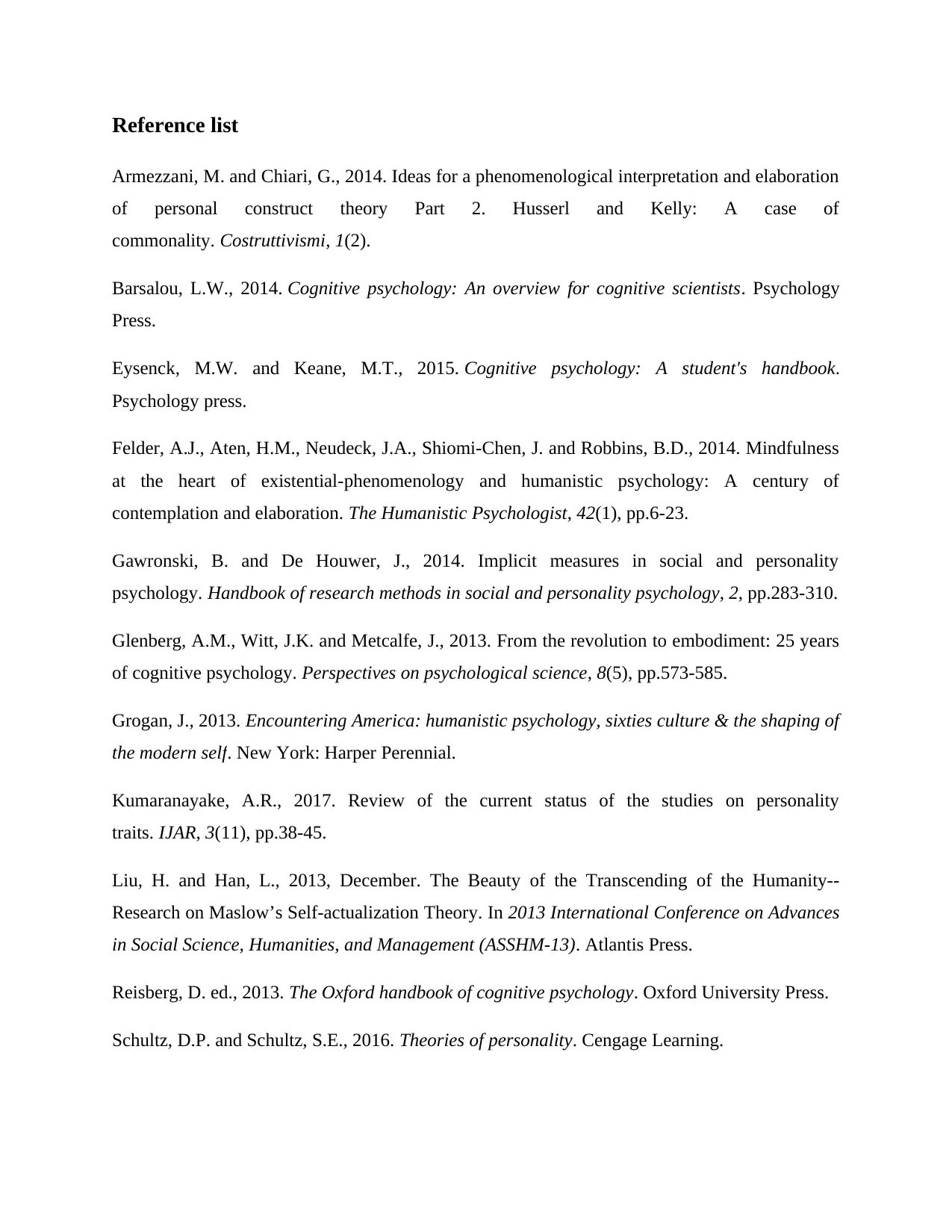
Reference list
Armezzani, M. and Chiari, G., 2014. Ideas for a phenomenological interpretation and elaboration
of personal construct theory Part 2. Husserl and Kelly: A case of
commonality. Costruttivismi, 1(2).
Barsalou, L.W., 2014. Cognitive psychology: An overview for cognitive scientists. Psychology
Press.
Eysenck, M.W. and Keane, M.T., 2015. Cognitive psychology: A student's handbook.
Psychology press.
Felder, A.J., Aten, H.M., Neudeck, J.A., Shiomi-Chen, J. and Robbins, B.D., 2014. Mindfulness
at the heart of existential-phenomenology and humanistic psychology: A century of
contemplation and elaboration. The Humanistic Psychologist, 42(1), pp.6-23.
Gawronski, B. and De Houwer, J., 2014. Implicit measures in social and personality
psychology. Handbook of research methods in social and personality psychology, 2, pp.283-310.
Glenberg, A.M., Witt, J.K. and Metcalfe, J., 2013. From the revolution to embodiment: 25 years
of cognitive psychology. Perspectives on psychological science, 8(5), pp.573-585.
Grogan, J., 2013. Encountering America: humanistic psychology, sixties culture & the shaping of
the modern self. New York: Harper Perennial.
Kumaranayake, A.R., 2017. Review of the current status of the studies on personality
traits. IJAR, 3(11), pp.38-45.
Liu, H. and Han, L., 2013, December. The Beauty of the Transcending of the Humanity--
Research on Maslow’s Self-actualization Theory. In 2013 International Conference on Advances
in Social Science, Humanities, and Management (ASSHM-13). Atlantis Press.
Reisberg, D. ed., 2013. The Oxford handbook of cognitive psychology. Oxford University Press.
Schultz, D.P. and Schultz, S.E., 2016. Theories of personality. Cengage Learning.
Armezzani, M. and Chiari, G., 2014. Ideas for a phenomenological interpretation and elaboration
of personal construct theory Part 2. Husserl and Kelly: A case of
commonality. Costruttivismi, 1(2).
Barsalou, L.W., 2014. Cognitive psychology: An overview for cognitive scientists. Psychology
Press.
Eysenck, M.W. and Keane, M.T., 2015. Cognitive psychology: A student's handbook.
Psychology press.
Felder, A.J., Aten, H.M., Neudeck, J.A., Shiomi-Chen, J. and Robbins, B.D., 2014. Mindfulness
at the heart of existential-phenomenology and humanistic psychology: A century of
contemplation and elaboration. The Humanistic Psychologist, 42(1), pp.6-23.
Gawronski, B. and De Houwer, J., 2014. Implicit measures in social and personality
psychology. Handbook of research methods in social and personality psychology, 2, pp.283-310.
Glenberg, A.M., Witt, J.K. and Metcalfe, J., 2013. From the revolution to embodiment: 25 years
of cognitive psychology. Perspectives on psychological science, 8(5), pp.573-585.
Grogan, J., 2013. Encountering America: humanistic psychology, sixties culture & the shaping of
the modern self. New York: Harper Perennial.
Kumaranayake, A.R., 2017. Review of the current status of the studies on personality
traits. IJAR, 3(11), pp.38-45.
Liu, H. and Han, L., 2013, December. The Beauty of the Transcending of the Humanity--
Research on Maslow’s Self-actualization Theory. In 2013 International Conference on Advances
in Social Science, Humanities, and Management (ASSHM-13). Atlantis Press.
Reisberg, D. ed., 2013. The Oxford handbook of cognitive psychology. Oxford University Press.
Schultz, D.P. and Schultz, S.E., 2016. Theories of personality. Cengage Learning.
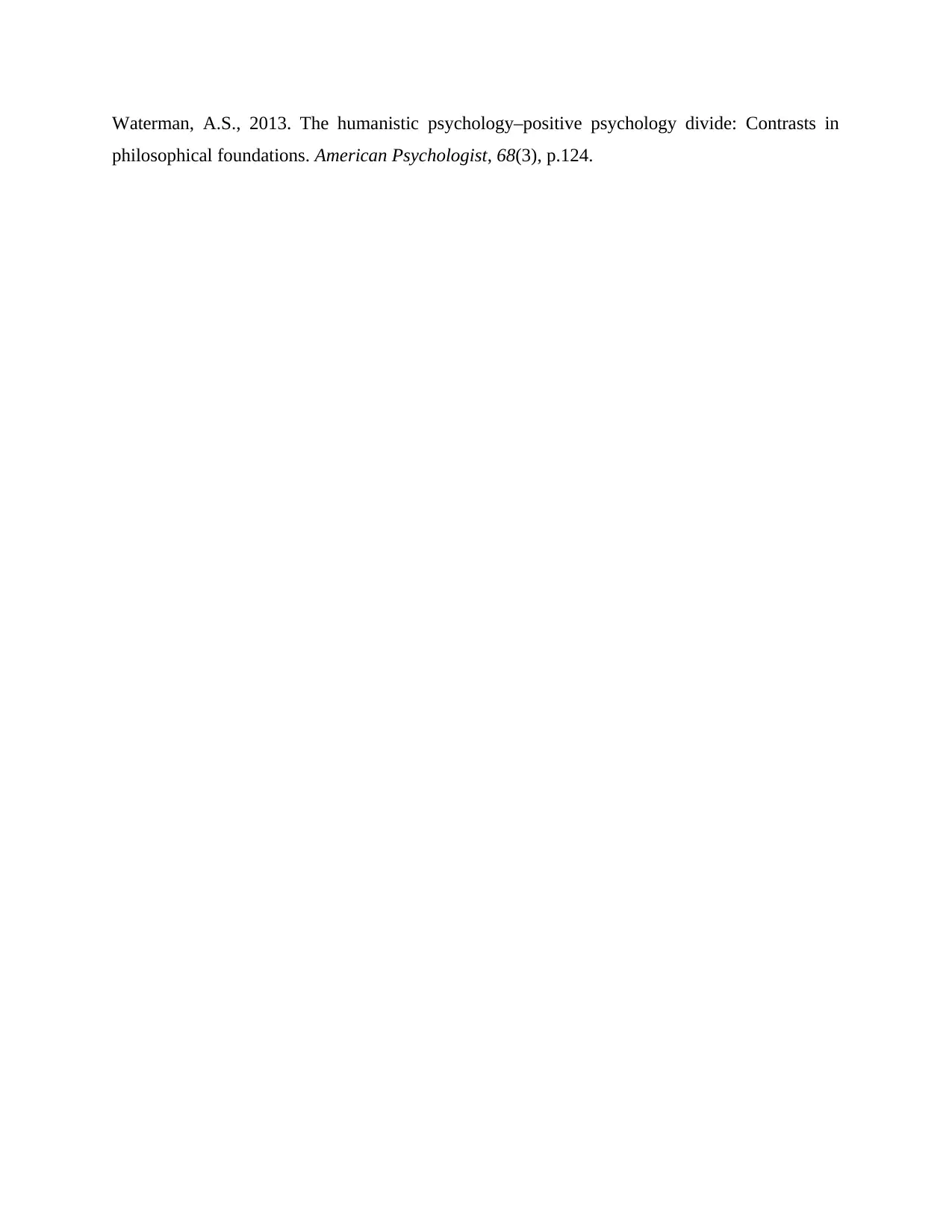
Waterman, A.S., 2013. The humanistic psychology–positive psychology divide: Contrasts in
philosophical foundations. American Psychologist, 68(3), p.124.
philosophical foundations. American Psychologist, 68(3), p.124.
⊘ This is a preview!⊘
Do you want full access?
Subscribe today to unlock all pages.

Trusted by 1+ million students worldwide
1 out of 6
Related Documents
Your All-in-One AI-Powered Toolkit for Academic Success.
+13062052269
info@desklib.com
Available 24*7 on WhatsApp / Email
![[object Object]](/_next/static/media/star-bottom.7253800d.svg)
Unlock your academic potential
Copyright © 2020–2026 A2Z Services. All Rights Reserved. Developed and managed by ZUCOL.




